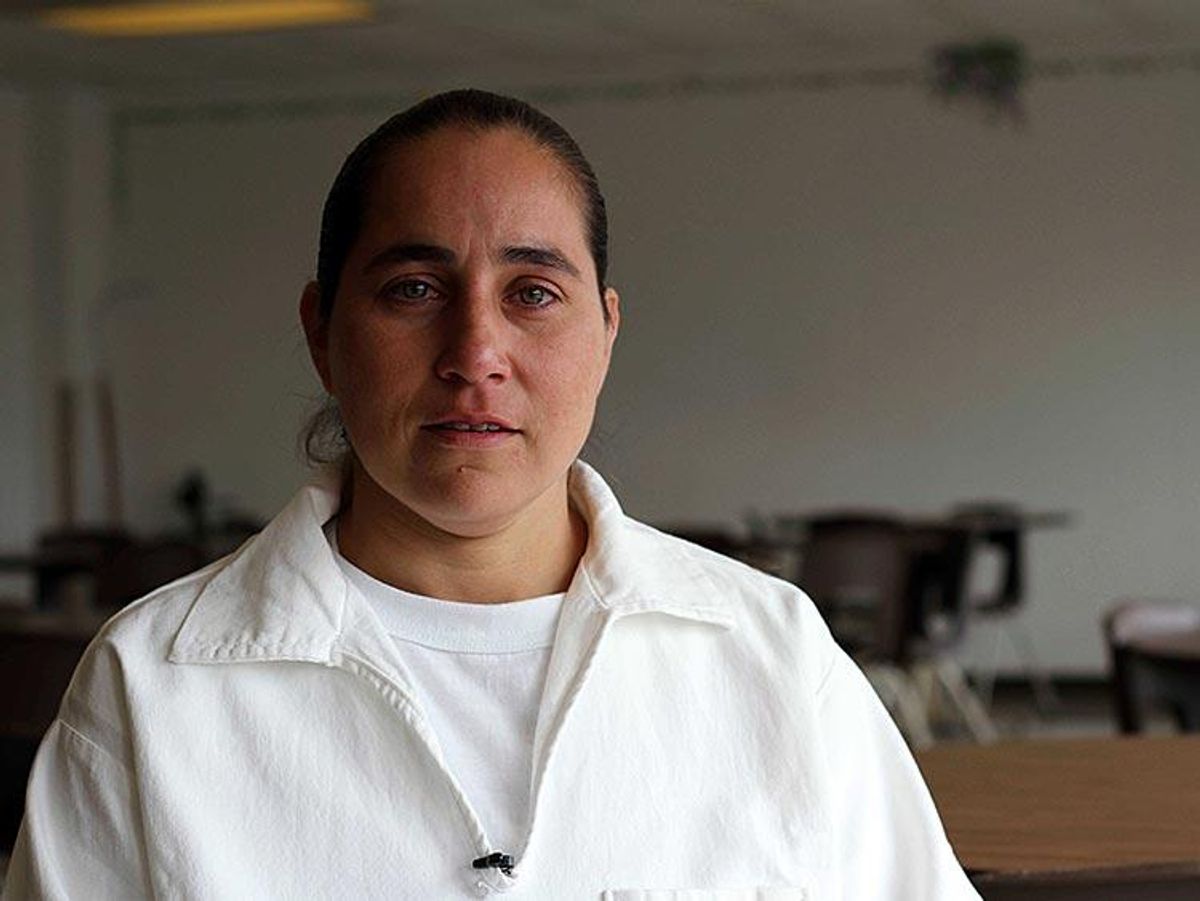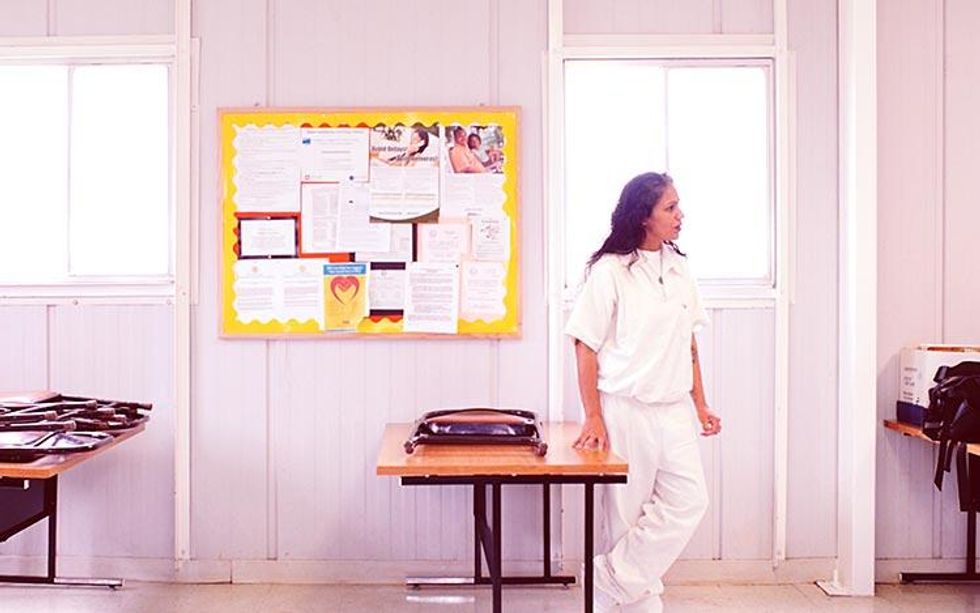Deborah Esquenazi was working as a radio reporter in Texas when she first heard of the San Antonio Four. A journalism mentor from New York, Debbie Nathan, sent her the court transcripts of the case, which centered around four Latina lesbians convicted of the gang rape of two children.
The case had haunted Nathan, who authored the 2001 book Satan's Silence: Ritual Abuse and the Making of a Modern American Witch Hunt. She urged Esquenazi to look into it. "This could be you," she said. "This could happen again."
At the time, Esquenazi was closeted, so the idea of an investigation involving four queer women seemed beyond what she was ready to face. But then she saw the VHS tapes -- home videos of the women and their families before the nightmare that awaited them in the criminal justice system. Esquenazi was struck and saddened by the joy on display.
"It was really hard to sit through it, wanting to shout it from the rooftops, 'Oh, my God, these women were totally railroaded. Look! They're so normal! They were just so happy.' And everything was taken away," Esquenazi told The Advocate.
"So much of our survival [as LGBT people] is based on the families that we make, and we have to make in order to stay protected," Esquenazi said. "And these women created that. ... They created a safe space. But even that wasn't enough."
Viewers of Esquenazi's new documentary, Southwest of Salem: The Story of the San Antonio Four, will likely have a similar outraged reaction to the injustices faced by its subjects. The women -- Elizabeth Ramirez, Cassandra Rivera, Kristie Mayhugh, and Anna Vasquez, who were all either 19 or 20 at the time of the initial allegations in 1994 -- were wrongfully convicted of molesting the nieces of Ramirez, after the girls had stayed a week with their aunt and her friends. Vasquez and Rivera were in a relationship. Ramirez had a child of her own. All of their lives were ruined in what Esquenazi would find to be a witch hunt fueled by misogyny and homophobia.
"The astonishment of it was so powerful, so shocking, so disturbing that I felt like it was my moral imperative to tell this story," she said.
Esquenazi's documentary seeks to exonerate these women, who tell their side of events from behind bars as well as in the immediate wake of their release. They served over-decade-long sentences and are still fighting to prove their innocence.
The film has played an active role in this process. In her interviews, Esquenazi spoke with one of the alleged victims, who is now in her 20s. She recanted the testimony she gave as a child. In doing so, she went against the wishes of her father, Javier Limon, who she says instructed her and her sister what to tell the court. (Ramirez said her brother-in-law did so after she spurned his advances -- he allegedly sent her flowers and love letters.) The recantation was not only a turning point for the documentary, but also for the women and the ongoing trial of public opinion.
"When it landed in our lap, it was like 'Oh, my God, this is really happening.' And then I caught it on camera, and I was like, 'Oh, my God, I think we have a really big story here,'" Esquenazi said.
In addition to their case, the documentary gives cultural and historical context to the fight these women face. During the '80s and '90s in the United States, the public was in the midst of a "Satanic Panic" revolving around fears that adult caregivers were engaging in demonic practices with children.

Cassie Rivera, Lane Murray Prison Unit. Courtesy Southwest of Salem
The case is part of that narrative, as it made national headlines at the time with courtroom tales of bacchanalian orgies, which sound more like plotlines from pornography than from any real-life encounters among queer women. It is also part of an age-old tale of how societies have demonized and persecuted women, queer people, and other vulnerable groups.
"This legacy of misogyny is so deep," Esquenazi said, explaining why she included this historical context to explore present-day justice. "I feel like these kinds of prejudices, they don't happen out of nowhere. And knowing that legacy I think, I hope, creates a context where we can think more critically about why these lenses exist."
Today, Esquenazi is still fighting alongside the women for their exoneration. The documentary concluded by showing a hearing in which a judge, despite compelling evidence and testimony, did not recommend exoneration. This decision was determined by the same judge who adjudicated their initial trial -- not an uncommon practice in the U.S. criminal justice system, which was just one of the aspects of this system that Esquenazi found "disturbing." To ensure that what happened to the San Antonio Four does not repeat itself, Esquenazi is also advocating for an upheaval and reevaluation of a criminal justice system that is biased against vulnerable communties.
At present, Esquenazi is encouraged by the "healthy questioning" she has observed regarding this system, and also of movements like Black Lives Matter, whose protests of the imprisonment of African-Americans and their deaths at the hands of law enforcement raise much-needed questions and awareness of this bias.
"Any time that we can create space for people who feel like they need to rise and speak about their oppression, and the fact that people are listening, is a good thing. It's a very good thing," she said.
However, after seeing the public dialogue over how to address these issues, Esquenazi wondered if the right queries are being asked of an institution that is "created off of the backs of slavery."
"I don't know why we never ask the question, 'Why the fuck did we start this system in the first place?' Because I don't think justice had anything to do with it," she said.
As an example, Esquenazi pointed to one of the main questions raised by audience members after viewing her film. Outraged by what happened to the its subjects, they ask, "How did this happen?"
"How does this not happen?" Esquenazi responded. "If we're talking about a system that was founded totally off principles that was meant to destroy, not to save, then maybe we're asking all the wrong questions."
The genre of true crime is having a moment in the United States. Last year the podcast Serial, which investigated the 1999 murder of Hae Min Lee and the prosecution of her ex-boyfriend Adnan Syed, became a cultural sensation. The same was true for the new Netflix show Making of a Murderer, which showed how a murder case was built against Steven Avery and his nephew. Their popularity has led to national outrage over systemic injustice and movements calling for these subjects' release.
Southwest of Salem is "queering true crime," said Esquenazi, who hopes it will spark similar public concern for the San Antonio Four. As queer women, they are not the usual subjects of the genre, which historically has been centered on "straight white men."
"We played with the genre to where people can be compelled by the plot points but then also feel as if they really get to know the women," said Esquenazi, who sees a connection between present-day social justice movements and a resurgence in interest in a genre "about who gets railroaded, about who gets discarded, about who gets ignored in our culture and our society."
The documentary also has personal significance to Esquenazi's life. It is her first feature-length documentary -- a craft she learned in order to tell the San Antonio Four's story in the best way she felt would do it justice.
She also came out in the process of creating the film, revealing her lesbian orientation to the women before her own family. This coming-out process hasn't been easy. In fact, it's been "exhausting," said the Texas native.
"I'm not on Facebook anymore, because my mental health couldn't take it," she said. "I can't watch another African-American person beat up, minimized, destroyed. I cannot handle any more gay families talk about being harassed walking down the street."
"I live in Austin, which everybody thinks is some liberal bastion," she continued. "If I leave with my wife and my child ... 40 miles out, we went to have lunch, because we wanted to have family day on a Sunday. And the looks that we were getting, because we were so clearly parenting this child -- the looks that we were getting made me feel like collapsing as we drove. I felt so sad for my son. I felt so angry."
Clearly, intolerance is not a thing of the past. As is evident in the title of Southwest of Salem, the case of the San Antonio Four is one of the more recent attacks on a marginalized group. But it is not the last. Any LGBT person who believes miscarriages of justice do not exist in present day needs only to look at a Trump rally and the dangers on display.
"If we are talking about an era of hysteria -- and that's what Southwest of Salem is really about -- I'm not sure we're past that," said Esquenazi. "I'm not sure that with Islamophobia, and with police brutality, the bathroom laws, the transphobia, and other things that I feel like we have somehow transcended into some kind of greater consciousness. I just see it being repackaged."
She hopes viewers understand this reality and use it as fuel for change. But they shouldn't just be outraged. They should also be inspired.
"What I would love for your readers to go see is extraordinary, extraordinary bravery, and courage, and camaraderie, and love between four friends who manage to fight against the juggernaut of a state," Esquenazi concluded.
"If they can do it, we can all do it. We have no excuses. If these four women with no resources and nothing but their friendship can do that, then imagine what we can achieve together as a community."
Those who want to assist the San Antonio Four in their fight for exoneration can do so in a number of ways, which are listed on the documentary's website.
They can also see the film, which is now playing in New York and Los Angeles. Watch the trailer below.



















































































